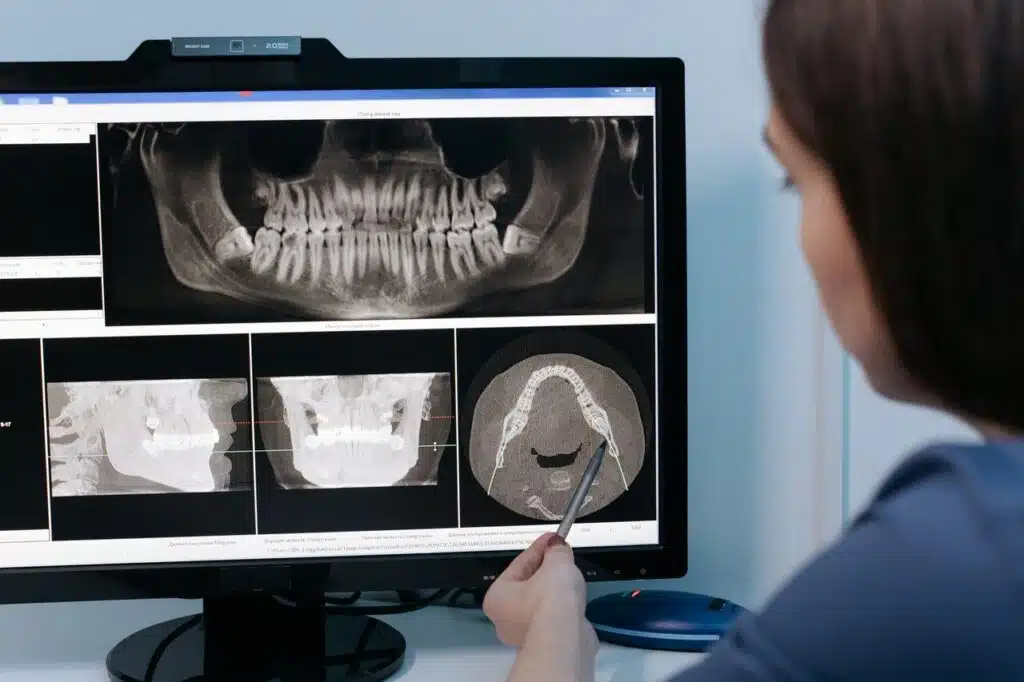A toothache can begin gradually or suddenly in the middle of the night. Although there are many potential causes of a toothache, an abscessed tooth is the most common. Understanding the causes, symptoms, and treatment for an abscessed tooth can help you avoid the serious consequences of delaying treatment. Learn more, and schedule an appointment with Trident General Dentistry today!
What is an Abscessed Tooth?
You get an abscessed tooth when the soft tissue inside your tooth gets infected. This tissue, known as the dental pulp, is made up of blood vessels and nerves. It is commonly referred to as the tooth’s nerve, and once it gets infected, the infection can spread to the surrounding gum and jaw. An abscessed tooth requires treatment as soon as possible to avoid severe consequences such as loss of the tooth or a medical emergency.
Risk Factors
Several factors increase the likelihood of an abscessed tooth, such as:
-
Poor oral hygiene. Not removing plaque daily from your teeth causes tooth decay, leading to infection of the dental pulp.
-
Lack of regular dental checkups. Regular dental checkups allow your dentist to treat dental cavities or replace dental restorations before they cause a dental infection.
-
High sugar diet. Eating and drinking foods with a high sugar content contribute to tooth decay and tooth abscesses.
-
Dry mouth. Medications and certain medical conditions cause a decrease in saliva production. The resulting dryness in your mouth can increase your chances of an abscessed tooth.
-
Smoking. Smoking doubles your chances of getting an abscessed tooth.
Complications of an Abscessed Tooth
An untreated abscessed tooth can cause an infection in the gum and jawbone surrounding the tooth. This infection can result in the tooth becoming loose and requiring removal. In more severe cases, a more serious infection known as cellulitis develops. Cellulitis can include fever, swollen lymph nodes, difficulty breathing, and spread to organs such as the heart. In extreme cases, an abscessed tooth leads to a life-threatening emergency.
Causes of an Abscessed Tooth
The hard outer layers of enamel and dentin protect teeth from damage. However, it is still possible for the soft tissue beneath these layers to get infected with bacteria. The most common causes include:
-
Deep tooth decay
-
Severe cracks through the enamel
-
Gum disease
-
Trauma
-
Defective dental restorations
-
Broken or chipped teeth
Symptoms
One of the reasons to have regular dental checkups is that abscessed teeth, in some cases, can receive treatment before causing any symptoms. Eventually, several symptoms can develop. These include:
-
Sensitivity to hot and cold foods and drinks
-
Pain when biting or chewing
-
Throbbing toothache
-
Swollen gum, jaw, face, or cheek
-
Referred pain to the sinus or ear
-
Headaches
-
Bad taste in your mouth
-
Difficulty swallowing or breathing
-
Swollen lymph nodes
-
Fever
Diagnosis
An abscessed tooth may require the following procedures for a diagnosis:
-
Thorough medical and dental history
-
Dental x-ray
-
Dental cone beam CT scan
-
Evaluating the tooth with cold and heat
-
Pressing and tapping on tooth and gum
Treatment Options
An abscessed tooth will not heal without treatment. The two treatment options are root canal treatment or tooth extraction. If swelling is present, the infection may require draining before or after treatment. You may also receive an antibiotic for a more severe infection.
Prevention
The best preventive measure you can take is to have regular dental examinations, x-rays, and professional teeth cleanings. Brushing twice a day and daily flossing is also essential to prevent plaque buildup and prevent cavities and gum disease.
Book Appointment
The best way to prevent an abscessed tooth is regular dental checkups. Contact Trident General Dentistry today to schedule an appointment for a thorough dental examination.

